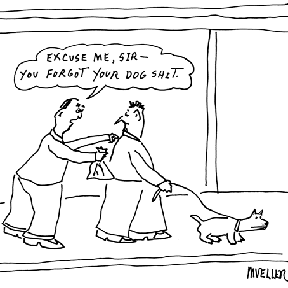REBECCA'S DOGSITTING: PROSPECTWALKS@GMAIL.COM
Friday, October 9, 2009
Is it Behavior or Genetics?
Epigenetics. Check it out sometime.
When scientists in the field of epigenetics observed rat mommas that were nurturing, that licked their babies, in comparison with those that took a paw-off approach and did not, they noted the following:
The unlicked babies had higher blood pressure. Their bodies were flooded with more of the stress hormones that actively promote heart disease, obesity and diabetes. When the unlicked babies were later placed with licking moms, and compared with those that stayed unlicked, they grew up to have far less health problems. Through nurturing behavior, the moms sculpted the genome of their babies.
In turn, there is some evidence that "Genetic Memory" does indeed exist in some form. That our ancestors' life experiences impacts our health, has been proven incontrovertibly. For instance, if one's great-great-grandparent experienced the Irish potato famine, generations later this will impact how one processes food, whether one is overweight, and whether one can or cannot withstand fasting.
What your grandmother was exposed to gets passed down to you – stress, smoking, pesticides. We have a responsibility for shaping our epigenome and passing it down to our kids - preferably improved!
The exciting thing to think about is that: We can change. So can our dogs and cats. And if we change, they certainly will too.
Now, let's get them out in the open air to walk, maybe even play!
When scientists in the field of epigenetics observed rat mommas that were nurturing, that licked their babies, in comparison with those that took a paw-off approach and did not, they noted the following:
The unlicked babies had higher blood pressure. Their bodies were flooded with more of the stress hormones that actively promote heart disease, obesity and diabetes. When the unlicked babies were later placed with licking moms, and compared with those that stayed unlicked, they grew up to have far less health problems. Through nurturing behavior, the moms sculpted the genome of their babies.
In turn, there is some evidence that "Genetic Memory" does indeed exist in some form. That our ancestors' life experiences impacts our health, has been proven incontrovertibly. For instance, if one's great-great-grandparent experienced the Irish potato famine, generations later this will impact how one processes food, whether one is overweight, and whether one can or cannot withstand fasting.
What your grandmother was exposed to gets passed down to you – stress, smoking, pesticides. We have a responsibility for shaping our epigenome and passing it down to our kids - preferably improved!
The exciting thing to think about is that: We can change. So can our dogs and cats. And if we change, they certainly will too.
Now, let's get them out in the open air to walk, maybe even play!
Labels: Practical Tips, Animal Behavior, Musings
Musings
Fearing Freedom

When monkeys raised in captivity, trapped their entire lives, are released from concrete and cages into open green spaces, they do not always know what to do.
One monkey, when released, paces back and forth on the narrow strip of concrete outside his trap door. He can't manage even the grass just beyond the concrete. He tries it out, but panics, returns to the concrete, pacing, anxious, finally recedes into the trap door.
Another monkey sees the open door to his cage, knows what to do, leaps past the concrete onto the grass, rolls around, sees the endlessness of the open space before him -- and the freedom he is about to experience -- and he does not hesitate, moves into the wide open, accelerating into a new life.
Labels: Practical Tips, Animal Behavior, Musings
Animal Behavior
The Urge to Play

The passion to play is a powerful learning tool. Animals tend to play in relaxed environments and don't tend to play with predators around. However, animals who live in high-risk environments know how to adapt, and often play in a high-risk way - this helps them to learn better how to contend with the risks around them.
Animals who don't learn how to play become rogues, and grow up to become aggressive and violent. Animals need to play daily, just like we need to talk to other people daily.
Labels: Practical Tips, Animal Behavior, Musings
Animal Behavior
"Owning" A Beast

Cats are like doorways,
the doorways they curl around,
because they exist on the edges,
between realities, this world and that,
civilized and beast.
They join us here for dinner,
while, with full bellies,
they nevertheless rip apart a mouse
for play.
They join us in our world, giving us the impression
they belong to it
and leaving suddenly to remind us
they do not.
When we try to coerce
their 'belonging' (or if they even sense we do)
if we forget, assume they are civilized,
their claws lash and eyes flash
in an instant to remind us -
they are certainly, indignantly, not,
not at all civilized.
How ridiculous. How perfectly preposterous.
Humans, such fools.
(Copyright, Refcah Manski 2009)
Labels: Practical Tips, Animal Behavior, Musings
Musings
Subscribe to:
Comments (Atom)


